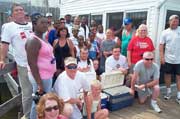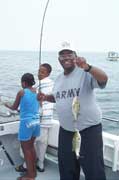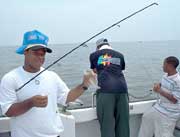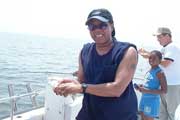|
|
 |
|||||||||||
|
Volume 13, Issue 29 ~ July 21 - 27, 2005
|
||||||||||||

|
story & photos by Carrie Steele In charting the course for fishing, two Bay captains were also steering veterans on the path to recovery. She’s never been on a fishing boat before. She didn’t know that she’d like fishing. But Ernita Warfield, 35, signed up to cast her line because she’s trying to get out more. In December, she didn’t know if she’d be able to walk again. But on a muggy mid-July afternoon, Warfield joined 35 other wounded or injured veterans — recovering at Walter Reed Army Medical Center in Washington, D.C. — and their families on a fishing trip out of Deale in Southern Anne Arundel County. They arrived by army bus for a day on the water aboard the Old Bay and the Darleen II, casting their lines and hoping to reel in peace of mind — and a few fish. “This will be my first time on a boat,” said Tracy Chambers, from New York, who gets around with a cane nowadays. “I can fly and jump out of an airplane,” he said, “so I should be all right on a boat.” While reeling in about 150 fish, some of the recovering veterans shared their stories with Bay Weekly. Their injuries ranged from broken bones to wounds to the psyche that can be harder to diagnose than physical injuries. So as captains charted the course for fishing, they were also steering veterans on the path to recovery. Going to War In Iraq, Warfield had worked in convoy transportation for four and a half months when she became so ill she had to pull up short. When she was flown to Germany for treatment, she caught a taxi ride to more trouble. The driver suffered a heart attack and crashed the cab. “I got messed up,” said Warfield, who broke a femur, hip, kneecap and two vertebrae in her neck as well as enduring more minor injuries in the wreck. That’s when she was flown back to Walter Reed, a period of four days she says she can’t remember. “When I first came to Walter Reed, some of my family came down. They saw me when I was really messed up,” said Warfield, a California native. “There were a lot of people that came during the holidays, like reporters.” It was good to have people to talk to, she said, because it helped her deal with the stresses of returning from war. As well as scars, she has a metal rod in her leg. On this sweltering Tuesday, Warfield’s muscular, medium-height frame, dark skin and tattoos don’t show her nine-month-old wounds. Now, she’s trying to heal inside, too. She usually shuns crowds. Even out on the wide open Bay in a boat with 15 people, she suffered what she called “a mild panic attack.” This was the second war for Warfield, who remarks the suitability of her last name to her career. She went to Kuwait in 1991. After her discharge, she joined up again in 2003. Now she says her war days are over. “I’m done. I’m going home,” she said. Warfield says she used to referee basketball games for kids, and when her leg gets stronger, she’d like to return to wearing black and white stripes and blowing a whistle on the court.
David Cowan, an epidemiologist from Walter Reed, coordinated with the Walter Reed Society’s Dan Bullis and Deale charter captains Jim Brincefield and Chad Muse to take the veterans out fishing. “Brincefield and Muse,” says Cowan, “are the guys that are making it happen. They’re giving up a day of work, plus providing the fuel and fishing supplies.” Cowan admits to being the catalyst. “I’m a retired military person and have been working in the medical research community. I know some of the problems that these folks are having. And I know how much I enjoy relaxing and catching fish,” added Cowan, who also coordinated the trip with the Deployment Health Clinical Center. “I thought it might be nice to do a little favor for these folks who have done so much for us.” When Cowan asked the two captains if they’d take the veterans, they jumped on the chance. Captain Muse of Darleen II does about five charity trips each year — out of an average 250 fishing trips — including a trip for the Wish a Fish Foundation, which helps sick children and their families get out on the water. Though he’s down some 30 paid trips this year, Muse said he gladly made time for the veterans. Brincefield rebounded from an accident of his own to make the trip on a borrowed boat, Old Bay. His own boat, the Jil Carrie, had been damaged in an on-water collision the week before. “We just couldn’t say no to our soldiers that were in Iraq and Afganistan,” said Brincefield. “We made room for the soldiers.” The charter captains took their fishermen and women to cast lines off the boats in Herring Bay, near Holland Point. After quick instructions, soldiers took the weighted lines — baited with bloodworm, squid and shrimp for bottom-fishing — and dropped them into 17 feet of water. Not 10 seconds after Mike Chambers of Baltimore dropped his line in, he reeled in a feisty spot. “Fish on! Fish on!” the angler’s success cry, sounded around the boat. He wasn’t alone. I dropped my line in a dozen times, each time promptly bringing up a wriggly, wild-eyed spot. Spot was the catch of the day, but the Bay also yielded small, white perch, croakers and small, throw-back rockfish. As the afternoon wore on, the heat set in and slowed the fishing. Some of the soldiers rested or napped.
The fishing trip is one of many excursions organized by community members, organizations and the USO for veterans whose lives now revolve around recovering. Just last weekend, vets recovering at Walter Reed headed for a Toby Keith and Stevie Nicks concert, where they got to meet both stars. “We were in the 10th row, so close we could feel the sound coming out of the speakers,” said Susan Kilmer, whose husband, Paul, is a veteran flown back from Iraq. “I can’t say enough about these USO trips,” Paul Kilmer said. “They’re more than great.” “The soldiers here are healing from different wounds and spend their day at Walter Reed trying to move forward. Some of them are stuck here,” said Bullis of the Deployment Health Clinical Center, a multi-disciplinary center that treats post-deployment health issues. “A diversion is fantastic therapy.” Injured soldiers now battle enemies on three fronts: their physical recovery; the mental effects of post-traumatic stress; and the psycho-social adjustment back into civilian life. Since the Civil War, symptoms such as fatigue, sleep disturbances, forgetfulness, encompassing pain, rashes and persistent headaches have been recognized in veterans. After World Wars I and II, soldiers returned home battling shell shock. In the Vietnam era, the condition was called post-traumatic stress. Its newest name is combat-oriented stress. Out on Darlene II, Mike Chambers had to lie down to relieve pain in his back. Lyn Albrecht, a management officer at the Deployment Health Clinical Center at Walter Reed, suggested he look into the three-week intensive training of a specialized care program. “It’s relaxation therapy,” she told Chambers. “This is for your head. You learn how to train yourself to deal with and manage your symptoms.” At Deployment Health Clinical Center, programs teach techniques to help returning soldiers get their internal life back in order. “You have this high tempo in combat, where you consistently have to be vigilant and alert,” said Albrecht. “You come back and you’re keyed up all the time and can get startled really easily.” Numbers Game
Paul Kilmer, 55, of Grand Rapids, Michigan, arrived back on United States soil on April 6. “I left my friends, my unit and all my stuff,” said Kilmer, who was about halfway through his tour when he was medivaced out of Iraq after an injury. He keeps in touch with his unit, which is scheduled to return home in December. Now, instead of fighting, he fished all afternoon alongside wife Susan, reeling in an 11-inch perch. Others say they can’t remember what happened to them or when. Floridian John Payne, 23, is a quiet fisherman, casting his line over the side of the boat all afternoon. Payne was a part of Operation Iraqi Freedom two years ago, when he was injured in an accident he says he doesn’t remember. At Walter Reed for four months, he jumped on the chance to go fishing, as he used to do back in Florida. “It helps take my mind off things,” he reports. “Fishing really calms me down.” What’s Next “I’d go back tomorrow,” said Kilmer. “But I’m on a blood thinner.” That treatment ends his war — but not his willingness to serve. “I hate that I left the job half done,” he says with a pained expression. Others aren’t so ready to jump back into deployment. Walking with a cane for support, Tim Squares, 42, of North Carolina, wishes he could be home this summer instead of recovering at Walter Reed. Squares came to Walter Reed in June of 2003 for surgeries after his medical unit was hit during a training exercise. He suffered back and brain injuries. He now stays at a motel near the medical center. The Red Cross, the community center and the community members have been great, he says. On a bass fishing trip this spring, he won eighth place. “It just helps to get out,” he says. But recovering away from home has cost him time. “I miss summer. I have a motorcycle at home,” he says, wistfully glan
Assadullah Khan from Kabul, Afganistan, an interpreter for the U.S. Army, came to America because of an eye injury. He’s had two eye surgeries already and has another scheduled. Spending the day fishing reminded him of fishing back home — though, he said, “we didn’t have boats like this.” He’ll be returning home to Afganistan when he’s recovered. On from the Bay “I’ve seen a lot of stuff,” Warfield said of her time in Iraq. But joining the fishing trip was fun. “It helps, without a doubt,” Warfield said. “A few months ago, I wouldn’t have wanted to come. I’m still trying to get back into the mainframe of civilian life. But I’m taking baby steps.”
|
|||||||||||
|
|
||||||||||||
|
© COPYRIGHT 2004 by New Bay Enterprises, Inc. All rights reserved. |





